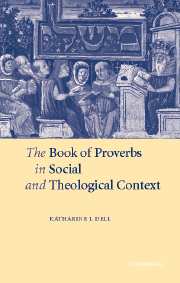Book contents
- Frontmatter
- Contents
- Preface
- List of Abbreviations
- Introduction
- 1 Social context(s) in Proverbs 1–9
- 2 Social context(s) in Proverbs 10:1—22:16
- 3 Social context(s) in Proverbs 22:17—31:31
- 4 Mention of Yahweh in Proverbs
- 5 Theological context
- 6 Echoes of other Old Testament texts and contexts in Proverbs
- Conclusion
- Bibliography
- Index
2 - Social context(s) in Proverbs 10:1—22:16
Published online by Cambridge University Press: 22 September 2009
- Frontmatter
- Contents
- Preface
- List of Abbreviations
- Introduction
- 1 Social context(s) in Proverbs 1–9
- 2 Social context(s) in Proverbs 10:1—22:16
- 3 Social context(s) in Proverbs 22:17—31:31
- 4 Mention of Yahweh in Proverbs
- 5 Theological context
- 6 Echoes of other Old Testament texts and contexts in Proverbs
- Conclusion
- Bibliography
- Index
Summary
Wisdom has existed as long as there have been people.
(Westermann, 1995: 135)The section of Proverbs 10:1—22:16 is usually regarded as a collection of sayings that were originally independent, hence the seemingly haphazard arrangement of one proverb after another, with only a few linkages in subject matter. However, at times, and recently by Weeks (1994) and Heim (2001), there has been an attempt to find longer sections that hang together. This is, once again, to raise the question of oral and literary stages, in that it may be that there has been a more careful placement of these proverbs at the writing-down stage than originally thought. However, in an oral prehistory they were probably of a more independent nature. The stress on the oral becomes greater in this section as the possible social context comes under discussion. There is also the issue of the nature of different proverbs; some have a more popular quality, while others may be the product of more educated circles, and all have a generally ethical character, most the result of observation and experience, some more exhortatory than others, most using ethical categories in opposite types, such as ‘wise man’ and ‘fool’ and ‘the righteous’ and ‘the wicked’. Another question that has been raised in scholarly circles is how ‘theological’ these proverbs are, given that many are maxims on everyday issues such as money, work and communication, and do not mention God specifically.
- Type
- Chapter
- Information
- The Book of Proverbs in Social and Theological Context , pp. 51 - 64Publisher: Cambridge University PressPrint publication year: 2006



